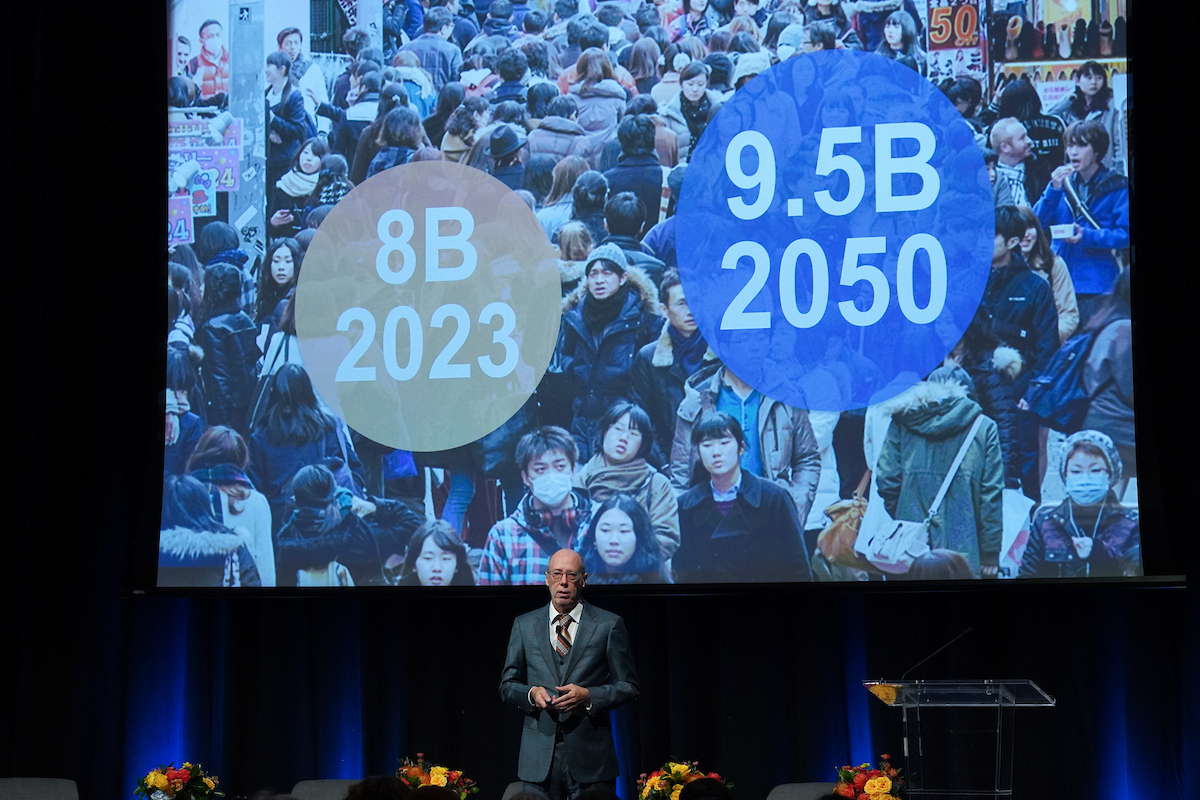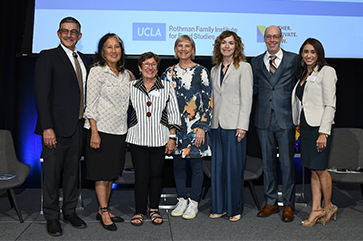‘The future of food’
UCLA experts discuss how we move this ‘universal connector’ forward at the inaugural installment of The Danny Kaye and Sylvia Fine Kaye Foundation Lecture Series
Vince Bucci
Click the play button above to watch the lecture in full.
By Álvaro Castillo | October 9, 2025
There are countless ways to nourish the body: staying hydrated, getting a restful night’s sleep, soaking up the sun — ideally with a healthy layer of sunscreen. But among the many elements that sustain us, one connects across cultures and continents: food.
And if you ask Jack Bobo — who delivered the keynote address at the inaugural installment of The Danny Kaye and Sylvia Fine Kaye Foundation Lecture Series, hosted by the UCLA Rothman Family Institute for Food Studies — the stories we tell about food nourish us too, shaping not just our diets but the globe’s culinary future.
“The stories we tell determine the future we get,” said RFI executive director Bobo, who returned to Los Angeles the day of the lecture after speaking at this year’s Climate Week NYC. “If the stories we’re telling about the future of food today are about doom, gloom and failure, I don’t think they’re inspiring people to take the action that we need.”
Students, including undergraduates pursuing a food studies minor, faculty and members of the broader Bruin community gathered at the Luskin Conference Center for an evening that celebrated culinary innovation, storytelling and — for those lucky enough to attend in person — an array of mouthwatering bocadillos featuring savory bites and irresistible sweets.
Introduced by the institute’s founder, Bruin alumna Marcie Rothman ’68, ’79, Bobo’s keynote address further explored the transformative link between storytelling and sustenance not just as metaphor, but as a lens for understanding global systems and their impact.
Bobo examined agriculture’s dual role as both a contributor to global challenges and a potential solution. With nearly 40% of Earth’s land devoted to farming and 70% of fresh water directed toward it, agriculture’s footprint is vast — and growing. Despite this, nearly 800 million people still go hungry, underscoring the urgency of rethinking how we feed the world.
“I believe that a different story would get a different outcome,” said Bobo.
Tracing agriculture’s 10,000-year evolution, Bobo called for a shift toward stories of progress and possibility. He highlighted how innovation has enabled farmers around the globe to produce more food without expanding farmland, preserving over a billion hectares of forest. Thanks to improved nutrition, global child mortality is at its lowest point in recorded history, and life expectancy and income have risen worldwide.
Through storytelling, Bobo argued, we can inspire action and shape a more hopeful, sustainable future.

Vince Bucci
“Things are not bad and getting worse,” Bobo said. “They are good — and getting better — but not fast enough.”
The lecture transitioned into a panel discussion featuring culinary changemakers working to improve food systems across Los Angeles. Moderated by RFI faculty director Amy Rowat, who holds UCLA’s
Marcie H. Rothman Presidential Chair in Food Studies, the panel included food activist, restaurateur and award-winning chef Mary Sue Milliken; Paula Daniels, the inaugural executive director of the Los Angeles County Office of Food Systems; and Pete Angelis, UCLA’s associate vice chancellor for Housing & Hospitality.
“At the UCLA Rothman Family Institute for Food Studies, we work closely with chefs, operational leaders and food systems advocates to ensure that our work reflects the complexity of food systems,” said Rowat. “These are visionaries redefining what’s possible.”
Certain ideas rose to the top of the discussion — from reimagining food procurement and expanding local partnerships to advancing advocacy through diverse communication strategies and UCLA-led innovation.
Drawing on her own experience growing up in Hawaii, Daniels urged reform, including reciprocal relationship with the land while chef Milliken emphasized how delicious food can open minds and drive healthier and more sustainable choices. Echoing their sentiments, UCLA’s Angelis described what goes into affordably serving 32,000 meals a day to 15,000 students — and how this additional mindfulness paired with cross-campus partnerships is preparing the university’s award-winning dining program for the Olympic global stage.
Though their advocacy journeys began in different places, the panelists shared a common thread: a commitment to improving the lives by strengthening food systems through innovation, strategic partnerships and forward-thinking policies.
The first in a series showcasing RFI’s local and global impact, the lecture was made possible by the Danny Kaye and Sylvia Fine Kaye Foundation, which honors the legacy of iconic entertainer Danny Kaye and composer Sylvia Fine, who were married for nearly half a century. Food was dear to Kaye’s heart — he was a master chef who taught cooking classes and dedicated himself to expanding and expressing his culinary abilities.
The power of food to unite the world across borders and disciplines should inspire us all, especially with the incredible conduit RFI provides, concluded Adriana Galván, dean and vice provost of undergraduate education, in her remarks.
“By amplifying the impactful faculty research at UCLA and providing critical student support engaging public programs like today’s lecture,” she said, “the institute is fast becoming a leader in the field of food studies.”




